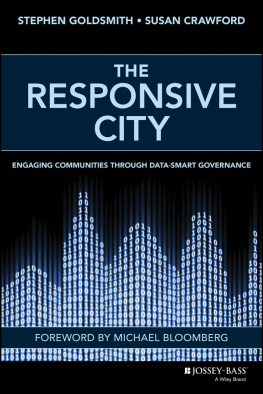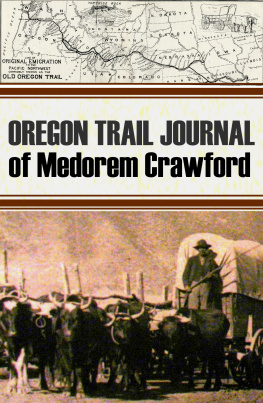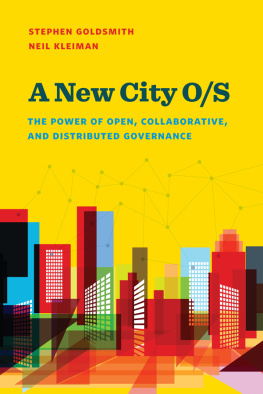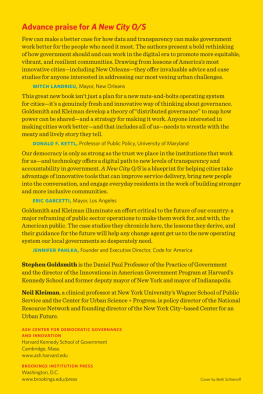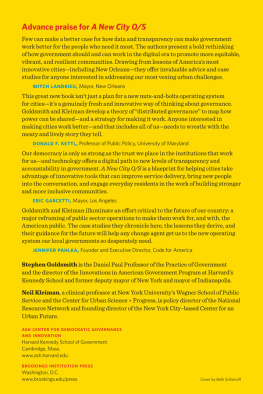Goldsmith Stephen Crawford Susan - The Responsive City
Here you can read online Goldsmith Stephen Crawford Susan - The Responsive City full text of the book (entire story) in english for free. Download pdf and epub, get meaning, cover and reviews about this ebook. City: Buenos Aires, Calchaqui River Valley (Argentina), Argentina--Calchaqui River Valley, year: 1963, publisher: Instituto de Desarrollo Económico y Social;Wiley, genre: Politics. Description of the work, (preface) as well as reviews are available. Best literature library LitArk.com created for fans of good reading and offers a wide selection of genres:
Romance novel
Science fiction
Adventure
Detective
Science
History
Home and family
Prose
Art
Politics
Computer
Non-fiction
Religion
Business
Children
Humor
Choose a favorite category and find really read worthwhile books. Enjoy immersion in the world of imagination, feel the emotions of the characters or learn something new for yourself, make an fascinating discovery.
- Book:The Responsive City
- Author:
- Publisher:Instituto de Desarrollo Económico y Social;Wiley
- Genre:
- Year:1963
- City:Buenos Aires, Calchaqui River Valley (Argentina), Argentina--Calchaqui River Valley
- Rating:3 / 5
- Favourites:Add to favourites
- Your mark:
- 60
- 1
- 2
- 3
- 4
- 5
The Responsive City: summary, description and annotation
We offer to read an annotation, description, summary or preface (depends on what the author of the book "The Responsive City" wrote himself). If you haven't found the necessary information about the book — write in the comments, we will try to find it.
The Responsive City — read online for free the complete book (whole text) full work
Below is the text of the book, divided by pages. System saving the place of the last page read, allows you to conveniently read the book "The Responsive City" online for free, without having to search again every time where you left off. Put a bookmark, and you can go to the page where you finished reading at any time.
Font size:
Interval:
Bookmark:

Copyright 2014 by John Wiley & Sons, Inc. All rights reserved.
Published by Jossey-Bass
A Wiley Brand
One Montgomery Street, Suite 1200, San Francisco, CA 94104-4594\hb www.josseybass.com
No part of this publication may be reproduced, stored in a retrieval system, or transmitted in any form or by any means, electronic, mechanical, photocopying, recording, scanning, or otherwise, except as permitted under Section 107 or 108 of the 1976 United States Copyright Act, without either the prior written permission of the publisher, or authorization through payment of the appropriate per-copy fee to the Copyright Clearance Center, Inc., 222 Rosewood Drive, Danvers, MA 01923, 978-750-8400, fax 978-646-8600, or on the Web at www.copyright.com. Requests to the publisher for permission should be addressed to the Permissions Department, John Wiley & Sons, Inc., 111 River Street, Hoboken, NJ 07030, 201-748-6011, fax 201-748-6008, or online at www.wiley.com/go/permissions.
Limit of Liability/Disclaimer of Warranty: While the publisher and author have used their best efforts in preparing this book, they make no representations or warranties with respect to the accuracy or completeness of the contents of this book and specifically disclaim any implied warranties of merchantability or fitness for a particular purpose. No warranty may be created or extended by sales representatives or written sales materials. The advice and strategies contained herein may not be suitable for your situation. You should consult with a professional where appropriate. Neither the publisher nor author shall be liable for any loss of profit or any other commercial damages, including but not limited to special, incidental, consequential, or other damages. Readers should be aware that Internet Web sites offered as citations and/or sources for further information may have changed or disappeared between the time this was written and when it is read.
Jossey-Bass books and products are available through most bookstores. To contact Jossey-Bass directly call our Customer Care Department within the U.S. at 800-956-7739, outside the U.S. at 317-572-3986, or fax 317-572-4002.
Wiley publishes in a variety of print and electronic formats and by print-on-demand. Some material included with standard print versions of this book may not be included in e-books or in print-on-demand. If this book refers to media such as a CD or DVD that is not included in the version you purchased, you may download this material at http://booksupport.wiley.com. For more information about Wiley products, visit www.wiley.com.
Library of Congress Cataloging-in-Publication Data
Goldsmith, Stephen, 1946
The responsive city : engaging communities through data-smart governance / Stephen Goldsmith and Susan Crawford.
pages com
Includes bibliographical references and index.
ISBN 978-1-118-91090-0 (hardback); ISBN 978-1-118-91121-1 (pdf); ISBN 978-1-118-91093-1 (epub)
1. Internet in public administrationUnited States. 2. Public-private sector cooperationUnited States. 3. Cities and townUnited States. 4. Digital mediaUnited States I. Crawford, Susan, 1963-II. Title.
JK468.A8G63 2014
352.3'821602854678dc23
2014019126
There is no better way to improve the lives of billions of people around the world than to improve the way cities work. For the first time in human history, the majority of the world's people live in cities. By 2050, 75 percent will. As more and more people move to cities, more and more of the world's challengesand solutionswill be concentrated there, too.
The rise of cities coincides with a technological revolution that is empowering local leaders to find innovative new ways to better serve the public. At the center of that revolution is our growing ability to use data to improve the services that government provides. Governments have long been in the business of keeping records, and increasingly they are using those recordsbillions of data pointsto improve everything from emergency response to education to transportation.
I have a rule of thumb: if you can't measure it, you can't manage it. And I brought that approach with me from the private sector to New York's city hall. Our administration looked for ways to use dataand to collect more datato help us better serve New Yorkers.
In 2003, we launched 311, a nonemergency government information and services hotline available to New Yorkers twenty-four hours a day, seven days a week. Not only did 311 make it easier for New Yorkers to get information from the cityand to file complaintsit also gave city government more information on what New Yorkers were concerned about and helped us keep track of how well we were doing at addressing those concerns.
We also created data systems to measure agency performance and hold ourselves accountable for results. And we took a page from the private sector and brought predictive analytics to local government, using city data to help foresee the challenges of the futureand took action to address them today.
Harnessing and understanding data helped us decide how to allocate resources more efficiently and effectively, which allowed us to improve the delivery of servicesfrom protecting children and fighting crime to repairing potholes and inspecting buildingswhile also saving taxpayer money.
Cities and mayors everywhere are recognizing the powerful role data can play in bringing more transparency, accountability, and efficiency to governmentand Bloomberg Philanthropies is helping to support this work. For instance, in 2013 the city of Chicago was one of five winners of the Mayors Challenge, an ideas competition for cities, for its groundbreaking idea to use data to help city government prevent problems before they develop. Chicago is quickly setting a new standard, which other cities will surely follow.
Across so much of the work we do with citiesfrom our innovation delivery program helping New Orleans reduce gun violence to our work with cities around the world to reduce carbon emissionswe see data enabling new and creative approaches. Of course, driving change in cities requires more than just data. It also requires strong managers and creative problem solversand Stephen Goldsmith is both. I was lucky to have him join me at city hall as a deputy mayor during my third term in office, and he helped us take our efforts to improve city services to new levels.
In the chapters that follow, Goldsmith and his talented coauthor, Susan Crawford, demonstrate how local leaders are changing the way governments work. Through case studies from New York City, Boston, and Chicago, they explain how data mining, empowered public servants, mobile apps, wireless devices, technically supported citizens, and social media can produce a dramatically more responsive city. And they show how these tools can be used by both elected and community leaders to drive change and improve a neighborhood's quality of life.
Cities will increasingly define the future, in America and around the world. And cities that capitalize on the technology revolution will lead the way. This book helps point the way forward.
June 2014
Michael Bloomberg
Former mayor of New York City
Urban government in the United States today is at a critical juncture. Never before over the last century has there been such a need to change the way city hall works. And never has there been such an opportunity to do it. The century-old framework of local governmentcentralized, compartmentalized bureaucracies that jealously guard information and adhere to strict work rulesis frustrating and disappointing its constituents, whose trust in government is at an all-time low. Residents in many cities despair of getting the services they need from city hall, especially in places where financial stresses are making governments even less responsive than in the past. Yet local government has the means to completely reverse this trend toward despair. That opportunity comes from digital technology: new ways of gathering, storing, and analyzing data; new modes of communication; and the new world of social networks. With these digital tools, citizens and their officials can revolutionize local government, making it more responsive, transparent, and cost-effective than it has ever been.
Next pageFont size:
Interval:
Bookmark:
Similar books «The Responsive City»
Look at similar books to The Responsive City. We have selected literature similar in name and meaning in the hope of providing readers with more options to find new, interesting, not yet read works.
Discussion, reviews of the book The Responsive City and just readers' own opinions. Leave your comments, write what you think about the work, its meaning or the main characters. Specify what exactly you liked and what you didn't like, and why you think so.

